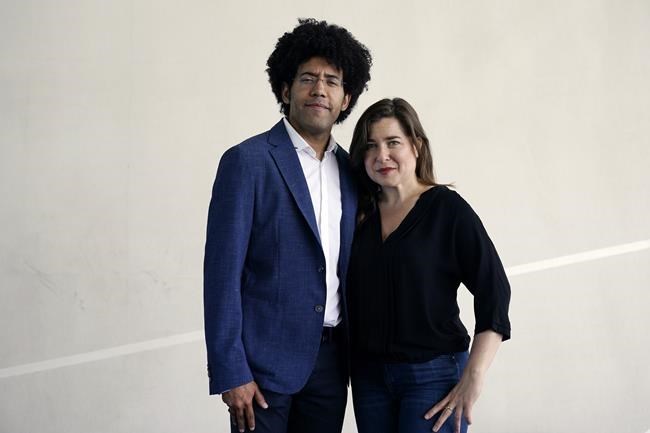
Cellist Alisa Weilerstein, right, and conductor Rafael Payare pose for a portrait at The Rady Shell at Jacobs Park, Wednesday, July 19, 2023, in San Diego. The couple are on a four-concert cross-country run that ends Friday night at Carnegie Hall. (AP Photo/Gregory Bull)
October 11, 2023 - 7:15 AM
NEW YORK (AP) — When cellist Alisa Weilerstein and conductor Rafael Payare fly for work, they need six plane tickets: one each for mom and dad, two for daughters Ariadna and Elina, one for the nanny and one for the cello.
“On all companies but one,” Weilerstein said, “the cello has to go with me. On Air Canada, on the lie-flat seats, where it actually matters, the cello is not allowed to go in business. I can go on business and the cello is allowed to sit separately.”
Getting this classical music glamour couple together for tours has become quite complicated.
Payare, 43, is in his fifth season as music director of the San Diego Symphony and leads the orchestra in a four-city, cross-country run that concludes at Lehigh’s Zoellner Arts Center in Bethlehem, Pennsylvania, on Thursday and New York’s Carnegie Hall the following night. Weilerstein joins him for the Dvorák Cello Concerto in B Minor, part of her schedule of roughly 80 performances each season.
A joint rehearsal with a special guest occurred in Gibraltar seven years ago. A monkey stole his baton and chomped off the tip.
“He just chewed on it and threw it down the cliff,” Payare said. “Ali took photos of me going down the cliff. I still have it.”
Weilerstein, 41, is a daughter of Donald Weilerstein, founding first violinist of the Cleveland Quartet, and pianist Vivian Hornik Weilerstein. Her brother is conductor Joshua Weilerstein.
She was drawn to the cello when she was 2 1/2. She had chicken pox while her parents were on tour, and grandmother Lotte Hornik Weininger created a toy music ensemble.
“She knew how much I loved listening to my parents practice and rehearse, and so she came up with a string quartet of instruments made out of cereal boxes,” Weilerstein said. “There were two violins, viola and cello, and the cello was made from a Rice Krispies box. The endpin was an old green toothbrush and the bow was a chopstick or a stick from outside, and I just scrubbed away at this thing. So my parents came back and they would rehearse and they put out a small stool for me so that I could participate if I felt like it on a tiny little stool.”
When Weilerstein was 4 she asked for a cello and a teacher, and her parents arranged them a half-year later. The family moved from Rochester to Cleveland when she was 7 and at 13 she made her professional debut with the Cleveland Orchestra in October 1995 with Tchaikovsky’s “Variations on a Rococo Theme.” She signed with ICM Artists (now Opus 3) and started playing one week per month with regional orchestras.
By 2011, she won a $500,000 MacArthur Foundation “genius grant,” the youngest of that year’s 22 recipients.
Since 2014, she’s played a Domenico Montagnana cello that turned 300 this year — airlines stopped allowing her instrument its own frequent flyer account in 2008.
Payere grew up among five siblings in Puerto la Cruz, Venezuela, and played horn as a child. He was introduced to Gustavo Dudamel while in the national children’s orchestra and they got to know each other in 1995 when Dudamel and his friends broke the top of a bunk bed. Payare fixed it with a piece of blinds, earning the nickname “MacGyver.”
He first thought of conducting when playing in a children’s orchestra in the late 1990s with Giuseppe Sinopoli. After winning the 2012 Malko Competition for conductors in Denmark — Weilerstein’s brother won the previous edition — Payare encountered Lorin Maazel.
“I was terrified. There was this urban legend about Maazel being a dictatorial, cold person,” Payare said.
Maazel invited him to conduct Beethoven’s third “Leonore” overture at his Castleton Festival in Virginia that summer.
“He was like a proud grandfather,” Payare recalled.
Payere met Joshua in 2007 when Weilerstein was a guest violinist on the Simón Bolívar Symphony Orchestra’s U.S. tour, which included Dudamel’s Carnegie Hall debut. Alisa first came across Payare in February 2009 at Goteborg, Sweden, where she was auditioning for Dudamel and Payare was invited to play horn in a Bruckner Symphony No. 7.
“I had no idea Josh had a sister,” Payare recalled. “I said, `Oh, say hello to your parents and to your brother.'”
She was asked by Dudamel to play the Dvorák concerto in Caracas. Payare was in the orchestra that Dec. 6 for Strauss’ “An Alpine Symphony” and she requested he sit in the seats during her rehearsal.
After the concert, they went to a sushi restaurant and have been a couple ever since. Three years later he proposed in his hometown. They married in August 2013 at the Caramoor Center for Music and the Arts in Katonah, New York.
Weilerstein and Payare own a home in San Diego and rent a house in Canada, where he is in his second season as music director of the Orchestre Symphonique de Montréal.
Ariadna is 7 and plays violin and piano. Elina turns 2 in January. Alisa tried to teach Elina to ask for daddy by playing the “Pa-pa-pa” from the Papageno-Papagena duet from Mozart’s “The Magic Flute.” It didn't quite take: Elina calls him “Ta-ta.”
Music is a part of the family routine.
“Sometimes around five and six there’s always that peak hour that they go a little nuts,” Payare said. “We call it hora loca in Spanish. And we created a playlist of second movements of Mozart symphonies and that somehow is like a sedative. They always immediately relax."
News from © The Associated Press, 2023